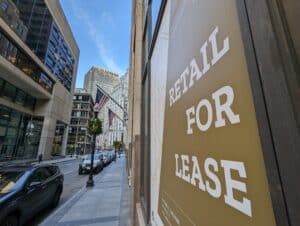Boston commercial property tax rates will be going up next year to help ease homeowners’ tax bills, but not by as much and not for as long as business groups had originally feared.
Mayor Michelle Wu’s office announced a compromise with a coalition of business groups – the Greater Boston Chamber of Commerce, developer trade group NAIOP-MA, the Boston Municipal Research Bureau and the Massachusetts Taxpayers Foundation – that had been battling her efforts to raise the tax rates on the city’s office, industrial and retail buildings to cover a hole created by collapsing office property values.
The deal will see the mayor file a new home rule petition with the City Council, which will then have to be passed by the Legislature to allow the city to exceed state caps on the share of its property tax haul that can be borne by commercial property instead of residential property. Senate President Karen Spilka had said Monday that the business community’s backing would be essential for her chamber to pass Wu’s earlier tax rate increase plan.
The deal announced just before noon on Wednesday would see the city shift the burden of taxes borne by commercial properties from 175 percent this year to no more than 181.5 percent in the next fiscal year – a red line for NAIOP-MA – 180 percent in fiscal year 2026 and 178 percent in fiscal 2027 before returning to the normal 175 percent in fiscal 2028. That means the increase in commercial rates will last two years less than Wu’s initial five-year proposal.
In addition, Wu’s office said the city will work to reduce the rate increase’s impact on small businesses, many of which would have been hit hard by the mayor’s initial plan thanks to common triple-net lease structures, which pass property taxes on to tenants.
The city will raise the personal property tax exemption threshold for small businesses from $10,000 to $30,000 and spend up to $15 million from its reserves over the next three years “to offset potential impacts on small businesses due to the shift,” Wu’s office said.
The proposal largely mirrors one released over the weekend by the business coalition that would see the average single-family home’s taxes increase 9 percent, in line with historical averages.
“Now we have certainty and predictability what the rates will be,” NAIOP-MA CEO Tamara Small told Banker & Tradesman in an email. “We obviously recognize this is not a solution to the complicated public financing economic challenges facing the city of Boston. There is a crisis facing commercial real estate, but this is a meaningful compromise.”
The deal comes after a tense, months-long standoff between Wu and the business community over the issue.
Wu has framed the issue as an attempt to protect services and cushion residential homeowners from a steep increase in their tax bills beginning in January. Business leaders said the move would be a gut punch to efforts to fix the city’s office vacancy problem by deterring tenants from leasing and potentially draining money that could be used for improvements needed to attract new tenants to vacant buildings.
Instead, Wu should cut the city budget, they argued, something Wu said was impossible thanks to collective bargaining agreements with city workers that were intended to account for the inflation of the last few years.
The deadlock appeared to break over the weekend when the Chamber and Wu’s office announced separate “compromise” proposals that were close, but which both sides rejected Monday as unworkable.
“For Boston to be a home for everyone, our residents and businesses depend on each other to thrive. As we continue working together on the challenges facing our communities and economy, I’m grateful for the strong leadership and partnership from across our neighborhoods and business community to plan for our shared future and economic growth. Thank you to Jim, Marty, Doug, and Tamara for your dedicated advocacy and partnership in reaching agreement to protect residents and provide stability. Thank you to Senate President Spilka for convening us through your leadership; and to Speaker Mariano, Chair Michlewitz, and Representatives, Council President Louijeune, Chair Coletta Zapata, and Boston City Councilors for advancing this proposal and continued support to get it done,” Wu said in a statement.
In statements accompanying the announcement from Wu’s office, business leaders urged civic and business leaders to turn towards fixing the city’s fiscal problems caused by vacant downtown offices.
“The compromise reflected in this agreement enables the city to move forward with its fiscal year 2025 process and for us all to now refocus our collective efforts on implementing a long-term strategy for a thriving post-pandemic downtown,” Doug Howgate, president of Massachusetts Taxpayers Foundation, said in a statement. “I want to thank Jim, Tamara and Marty for their leadership in this work, the Mayor and her team for the ongoing dialogue, and House and Senate leadership for their commitment to reaching a compromise.”
Banker & Tradesman staff writer Steve Adams contributed to this report.







